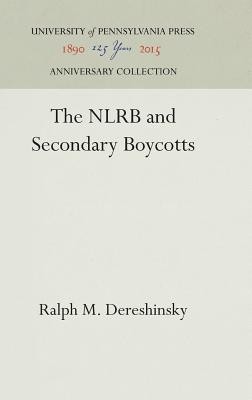
- We will send in 10–14 business days.
- Author: Ralph M Dereshinsky
- Publisher: University of Pennsylvania Press Anniversary Collection
- ISBN-10: 0812290755
- ISBN-13: 9780812290752
- Format: 15.6 x 23.4 x 1 cm, hardcover
- Language: English
- SAVE -10% with code: EXTRA
Reviews
Description
As unions increasingly resort to corporate campaigns, top-down organizing, neutrality agreements, and consumer boycotts, it is easy to forget that federal labor laws were designed to eliminate the causes of substantial obstructions to the free flow of commerce.
Our global economy continually shows that the fortunes of different companies increasingly are interdependent. At the same time, federal labor laws in the U.S. place important restrictions on secondary boycotts--defined as picketing or other union efforts based on one company's dispute to disrupt the affairs of other companies and consumers. Secondary boycotts have played an even more important role in the construction industry, where union disputes often affect dozens of employers working at a single location. Secondary boycotts present among the most complex problems dealt with by U.S. labor laws. This book examines how federal law limits secondary picketing and comparable activity, while preserving First Amendment free speech rights and protecting primary union activity, even though picketing or pressure directed toward one company almost always affects other parties and people. Ralph M. Dereshinsky looks at the development of labor law, National Labor Relations Board decisions, and court reviews relating to four types of secondary boycott situations. A case-by-case analysis is made to determine the direction and consistency of Board and cournt handling of labor-management disputes over common-situs picketing, allied employer picketing, consumer boycotts, and hot-cargo agreements.EXTRA 10 % discount with code: EXTRA
The promotion ends in 17d.22:53:14
The discount code is valid when purchasing from 10 €. Discounts do not stack.
- Author: Ralph M Dereshinsky
- Publisher: University of Pennsylvania Press Anniversary Collection
- ISBN-10: 0812290755
- ISBN-13: 9780812290752
- Format: 15.6 x 23.4 x 1 cm, hardcover
- Language: English English
As unions increasingly resort to corporate campaigns, top-down organizing, neutrality agreements, and consumer boycotts, it is easy to forget that federal labor laws were designed to eliminate the causes of substantial obstructions to the free flow of commerce.
Our global economy continually shows that the fortunes of different companies increasingly are interdependent. At the same time, federal labor laws in the U.S. place important restrictions on secondary boycotts--defined as picketing or other union efforts based on one company's dispute to disrupt the affairs of other companies and consumers. Secondary boycotts have played an even more important role in the construction industry, where union disputes often affect dozens of employers working at a single location. Secondary boycotts present among the most complex problems dealt with by U.S. labor laws. This book examines how federal law limits secondary picketing and comparable activity, while preserving First Amendment free speech rights and protecting primary union activity, even though picketing or pressure directed toward one company almost always affects other parties and people. Ralph M. Dereshinsky looks at the development of labor law, National Labor Relations Board decisions, and court reviews relating to four types of secondary boycott situations. A case-by-case analysis is made to determine the direction and consistency of Board and cournt handling of labor-management disputes over common-situs picketing, allied employer picketing, consumer boycotts, and hot-cargo agreements.

Reviews